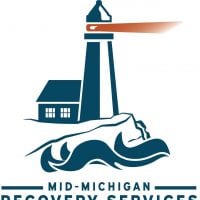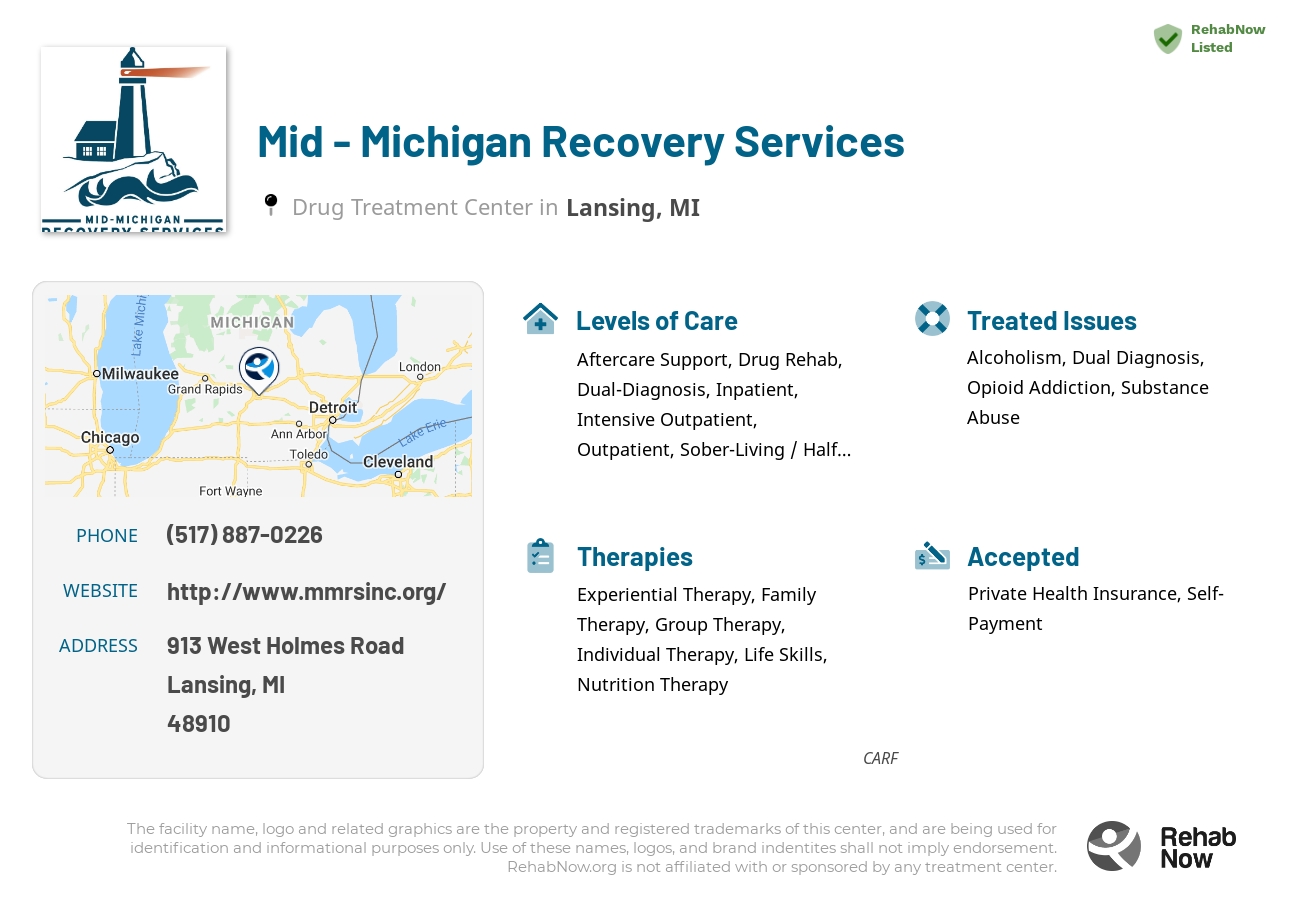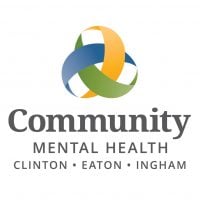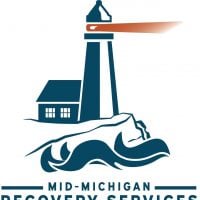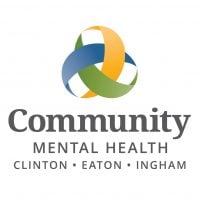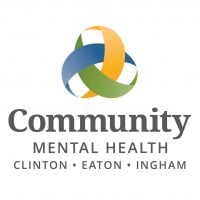Mid - Michigan Recovery Services
Drug Rehab Center in Lansing, Michigan
Mid-Michigan Recovery Services in Lansing, Michigan is an addiction treatment facility that offers a comprehensive approach to recovery through evidence-based treatments and interventions for individuals suffering from alcohol and drug abuse, mental health conditions, and co-occurring disorders, including residential, inpatient, intensive outpatient, and sober-living /half-way levels of care, as well as aftercare support and accredited by CARF.
About Mid - Michigan Recovery Services in Michigan
Mid-Michigan Recovery Services, located in Lansing, MI, focuses on a holistic and personalized approach to substance abuse treatment. Their unique philosophy combines a full continuum of care with evidence-based practices, ensuring that each client's individual needs are met. This facility stands out for its comprehensive support services, including education, assessment, and housing programs.
- Offers a personalized treatment plan for each client, highlighting their commitment to individualized care.
- Provides a variety of care levels, including residential, inpatient, and intensive outpatient, to suit different recovery needs.
- Accredited by the Commission on Accreditation of Rehabilitation Facilities (CARF), ensuring high-quality treatment standards.
Mid-Michigan Recovery Services is recognized for its dedication to quality care, holding CARF accreditation. Their approach integrates a variety of treatment services tailored to the unique goals and needs of each individual, emphasizing the importance of a personal path to recovery.
The facility addresses addiction to alcohol and drugs, mental health conditions, and co-occurring disorders. Treatment methods include cognitive-behavioral therapy, relapse prevention, individual and group counseling, and holistic therapies, offering a comprehensive and secure environment for recovery.
Genders
Ages
Modality
Additional
Accreditations

CARF
The Commission on Accreditation of Rehabilitation Facilities (CARF) is a non-profit organization that specifically accredits rehab organizations. Founded in 1966, CARF's, mission is to help service providers like rehab facilities maintain high standards of care.
Conditions and Issues Treated
Some addicts can benefit from substance abuse treatment, which is designed to help them become and remain sober without the use of medications. These programs are typically used by those struggling with drugs like marijuana or hallucinogens. However, they might be beneficial for those with a co-occurring mental health disorder like schizophrenia, major depression or bipolar disorder.
During this type of treatment, the addict will meet with therapists and other professionals on a regular basis to learn coping skills and healthy ways to deal with their addiction and mental health disorder.
Treatment programs often combine medications with counseling, support groups and even medical services like those found in hospitals or doctor’s offices. There are also detoxification services that addicts can use to get sober and avoid severe withdrawal symptoms.
Opioids are a group of drugs that include substances such as heroin, morphine, and oxycodone. These drugs activate opioid receptors in the brain, which produce pleasurable feelings. Opioid addiction occurs when drugs are abused at increasing rates or increasing amounts because the body becomes tolerant of them.
Opioid addiction is typically diagnosed when drug abuse becomes a typical behavior that interferes with an individual’s ability to function daily. The use of the substance results in consequences like legal problems.
Treatment for opioid addiction varies depending on each individual’s needs. Some treatments focus on replacing opioids with other drugs that have similar effects of reducing withdrawal symptoms. Other treatments aim to reduce the risk of relapse by providing psychological support or using more natural methods.
A drug rehab center that uses Dual Diagnosis is more likely to be successful in rehabilitating a person. Dual diagnosis helps to identify and treat any co-occurring disorders. It is essential to screen for both addiction and any untreated mental health issues. A dual diagnosis gives rehab the means to treat addiction while restoring mental and emotional health.
About 70% of patients with drug addiction have at least one other psychiatric diagnosis. Fortunately, dual diagnosis treatment is a proven model that has been highly effective.
Levels of Care Offered
This center offers a variety of custom treatment tailored to individual recovery. Currently available are Aftercare Support, Drug Rehab, Dual-Diagnosis, Inpatient, Intensive Outpatient, Outpatient, Residential, Sober-Living / Half-Way, with additional therapies available as listed below.
Inpatient rehab means you live there while your addiction or co-occurring disorder is treated. Prescribed medications are used along with counseling.
This type of rehabilitation provides a drug-free environment for people who struggle with chronic/long-term addiction (or their own home). Jobs or school can be put on hold until after the stay to focus solely on recovery.
An intensive outpatient program is usually the first phase of addiction treatment. It provides relief for those addicted, but not ready to commit to an inpatient setting. IOPs consist of a daily 3 to 5-hour program, and there is a required number of hours per week. The goal here is to teach patients healthy coping skills, such as stress management.
Outpatient programs offer a lower intensity level of addiction treatment than inpatient facilities. They are ideal for those who have graduated from inpatient facilities, have a supportive home environment, and are motivated to commit to the program. Services offered include medication-assisted treatment, individual and group therapy, and peer group support.
This treatment is a popular option for those suffering from a lower intensity addiction. It is not advisable for someone who needs to go through a medically supervised detox or does not have a supportive home environment. It requires motivation and dedication to commit to the program without constant monitoring.
Sober Living Homes are an option for those who have completed a treatment program within the past several months. However, it isn’t advisable to use this as a permanent living arrangement because it can lead to a relapse .
The goal of a sober living home is to provide a supportive environment for recovering addicts so they don’t need to return to their previous lifestyles. The homes will not accept residents who are still using drugs or alcohol, and those living in the house must follow a set of rules dictating how they should behave to avoid relapsing.
Residential treatment programs are those that offer housing and meals in addition to substance abuse treatment. Rehab facilities that offer residential treatment allow patients to focus solely on recovery, in an environment totally separate from their lives. Some rehab centers specialize in short-term residential treatment (a few days to a week or two), while others solely provide treatment on a long-term basis (several weeks to months). Some offer both, and tailor treatment to the patient’s individual requirements.
Aftercare Support in drug rehab is crucial because it helps people stay sober after treatment. Aftercare Support in drug rehab is helpful because it provides the recovering person with a support group, including family members, friends, and other peers who are also in recovery.
The benefits of Aftercare Support are that it provides a pathway that will help people get sober for life. It supports healing at all levels, physical, mental, emotional, and spiritual. Another benefit of Aftercare Support is that participants learn to maintain their sobriety through holistic methods. They learn to modify behaviors individually to have peace of mind, have positive relationships with others, and find peace on the inside.
Therapies & Programs
During individual therapy at Mid - Michigan Recovery Services in , the person in recovery meets with a therapist one on one to go over their situation and learn from past mistakes. The counselor or therapist will use this time to address the causes of addiction, triggers, and any mental issue or dual diagnosis. They will also address aftercare plans, giving them the best chances of long-term sobriety.
This therapeutic process is very intense and challenging to go through. Some clients may find it easier to open up with someone apart from their family or loved ones who understand their struggles and experience with addiction.
Family therapy is designed to help addicts get clean and sober by using what they love the most; their family. Most drug treatment centers make it mandatory that the addict’s family attend therapy sessions, which is great because having everyone there to support them makes it much easier for them to get clean. Not only are they surrounded by people who want them to get better, but everyone is there because they want the best for them, not because they feel like they have to be.
Drug addicts are often surrounded by resentful or uneducated family members who would, at times, rather see them stay addicted because it makes their own lives easier. Sometimes they don’t understand what the addiction is or how they play a part in it. They know that during and after the addict’s sobriety journey, they will face challenges and changes that they aren’t sure how to handle. This can be very tough for an addict to go through on their own, which is why it’s so important that they have the support of their family. Just because someone is an addict does not mean that they don’t deserve the love and support of those around them.
Addicts in Lansing, MI can find support in group therapy at Mid - Michigan Recovery Services by finding peers who understand their situation and being held accountable. They also learn to develop faith, understanding, and insight into their addiction through shared conversations.
Group Therapy is employed by drug treatment centers to provide the recovering addict with a platform to talk about their feelings and experiences. It also provides for an opportunity to learn from other addicts who have successfully overcome their addiction. It is recommended that all group members be recovering addicts for this type of therapy to work.
Cognitive Behavioral Therapy (CBT) helps addicts comprehend the causes of their substance abuse and the consequences that follow. The treatment’s goal is to help addicts gain self-control and maintain abstinence from drugs and alcohol over the long term. Through CBT, clients learn to recognize and avoid high-risk situations and cope with challenging situations when they arise.
Many people who struggle with addiction in Lansing, Michigan also have trouble managing their daily responsibilities after treatment. With this type of therapy, addicts are taught how to manage their time, attain specific goals, and take care of all facets of their lives without the influence of drugs or alcohol.
During these sessions, therapists will work with addicts to identify personal values and goals. They will then help addicts set goals for achieving those values and standards. In the process, therapists help addicts develop strategies for fulfilling their goals and successfully managing their responsibilities.
In many cases, this type of therapy is used in conjunction with other types of addiction treatment services to address specific issues that affect a recovering addict’s ability to stay sober.
Nutrition therapy has been used as a treatment modality for addiction recovery and in eating disorders for adults, adolescents, and children. Specific nutrients have been identified that influence neurotransmitters associated with reward pathways of the brain. Carbohydrate loading with complex carbohydrates to elevate serotonin levels was effective in treating bulimia nervosa. This approach prompted researchers to explore the use of this type of nutritional intervention in other disorders.
Nicotine replacement therapy is a popular method of treatment that helps individuals overcome their addiction to cigarettes by providing them with safer alternatives. Nicotine replacement options can include:
- Inhalers
- Gum
- Patches
These treatments are often used in combination with other therapies, such as cognitive behavioral therapy or motivational interviewing, to help individuals more easily transition into a smoking-free lifestyle.
Patient Experience
Experiential Therapy at Mid - Michigan Recovery Services
Experiential therapy is a type of treatment involving immediate, intense experiences designed to manage addiction. Experiential therapy is beneficial for:
- People who are seeking to overcome an addiction but have difficulty focusing on treatment goals
- People with short attention spans due to high levels of stress or difficulty concentrating
- People who are afraid of engaging in treatment due to negative past experiences
Payment Options Accepted
For specific insurance or payment methods please contact us.
Is your insurance accepted?
Ask an expert, call (888) 674-0062
Mid-Michigan Recovery Services Associated Centers
Discover treatment facilities under the same provider.
Learn More About Mid-Michigan Recovery Services Centers
Additional Details
Specifics, location, and helpful extra information.
Lansing, Michigan 48910 Phone Number(517) 887-0226 Meta DetailsUpdated April 15, 2024
Staff Verified
Mid - Michigan Recovery Services Patient Reviews
There are no reviews yet. Be the first one to write one.
Lansing, Michigan Addiction Information
Michigan has the second-highest rate of drug and alcohol abuse in the nation. Heroin is linked to more than 50% of the state's hepatitis C cases. Marijuana is the drug most often associated with crimes in Michigan, followed by methamphetamines. Opioids alone are responsible for almost 20% of all drug overdose deaths in Michigan.
In Lansing, the most common types of drugs that people abuse include heroin, meth, and cocaine. In 2013, over 300 people died from a heroin overdose in Lansing. 1 out of every 25 adults in Lansing has an alcohol addiction. 4.8% of Michigan's population abuses illicit substances. In Lansing, MI inpatient rehab centers can provide users with the medical care and resources they need in order to get sober.
Treatment in Nearby Cities
- Clarkston, MI (58.2 mi.)
- Chelsea, MI (38.1 mi.)
- Jonesville, MI (49.5 mi.)
- Pigeon, MI (102.0 mi.)
- Imlay City, MI (78.7 mi.)
Centers near Mid - Michigan Recovery Services
The facility name, logo and brand are the property and registered trademarks of Mid - Michigan Recovery Services, and are being used for identification and informational purposes only. Use of these names, logos and brands shall not imply endorsement. RehabNow.org is not affiliated with or sponsored by Mid - Michigan Recovery Services.
